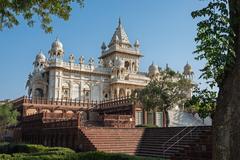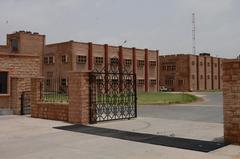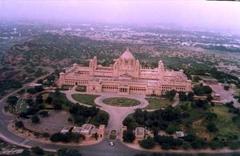Lohawat, Jodhpur, India: Visiting Hours, Tickets, and Historical Sites Guide
Date: 04/07/2025
Introduction
Lohawat, a scenic rural village in the Phalodi tehsil of Rajasthan’s Jodhpur district, offers travelers an immersive introduction to authentic Rajasthani culture, history, and natural landscapes. Situated near the edge of the Thar Desert, Lohawat embodies the heritage of the Marwar region and the Rathore dynasty, with its villages showcasing centuries-old crafts, folk traditions, and vibrant festivals. The Bishnoi community’s presence, particularly through the Lohawat Bishnoi Temple, highlights the area’s dedication to ecological stewardship and spiritual values.
For those looking to experience Rajasthan beyond the main tourist circuits, Lohawat is a gateway to open village life, accessible temples, and natural attractions—most of which require no entry fee. The area is easily reached by road from Jodhpur and Phalodi, with the best visiting period from October to March, when the weather is agreeable and local festivities are in full swing. Lohawat’s proximity to Mehrangarh Fort and Khichan’s famous birding sites rounds out a diverse itinerary for curious travelers.
This guide presents everything you need for a successful visit, including visiting hours, ticketing details, travel logistics, accommodation options, and cultural insights. For more information, consult official tourism portals and regional travel blogs (Rajasthan Tourism - Jodhpur, Manvar Blog - Lohawat Bishnoi Temple and Khichan Cranes).
Contents
- Introduction
- Historical and Cultural Overview
- Visiting Lohawat: Essential Information
- Visiting Hours & Entry
- Accessibility & Travel Tips
- Amenities & Facilities
- Nearby Attractions
- Special Events & Cultural Highlights
- Photography & Visuals
- Frequently Asked Questions (FAQs)
- Practical Tips for Visitors
- Conclusion & Resources
Historical and Cultural Overview
Lohawat’s roots are intertwined with the rise of the Marwar kingdom and the Rathore dynasty. The village and surrounding region have preserved centuries-old customs, including folk music, festivals, and artisanal crafts. The Bishnoi community, prominent across Lohawat, is renowned for its environmentalism and spiritual heritage, best represented by the Lohawat Bishnoi Temple.
The area’s villages, such as Lohawat Jatahwas, showcase traditional mud-walled homes, vibrant attire, and daily agricultural life. Small temples and shrines are central to the community, hosting daily rituals and festival celebrations (VillageInfo.in - Lohawat Jatahwas).
Visiting Lohawat: Essential Information
Visiting Hours & Entry
- Lohawat Village & Temples: Open access; visitors can explore throughout the day. Temples are typically open from 6:00 AM to 8:00 PM. Early mornings and late afternoons are ideal for observing daily life and cultural activities.
- Tickets: No entry fees are required for visiting Lohawat’s villages or temples. Some guided experiences or workshops may have nominal charges.
Accessibility & Travel Tips
- By Road: Lohawat is about 120 km from Jodhpur and 30 km from Phalodi. The nearest railway station is Marwar Lohawat, with regional train connections.
- Transport: Private taxis or local buses from Jodhpur/Phalodi are recommended for flexibility. Roads are generally good, but monsoon rains (July–September) may temporarily affect access.
- Best Time to Visit: October to March, when weather is mild and festivals are frequent.
- Accessibility: Village terrain is mostly flat but may include unpaved paths. Travelers with mobility challenges should plan ahead.
Amenities & Facilities
- Accommodation: Limited in Lohawat itself; more options in Phalodi and Jodhpur, including guesthouses and heritage hotels.
- Food: Local eateries and homestays serve traditional Rajasthani cuisine.
- Essential Services: Banking and postal services available in larger villages or nearby towns.
- Connectivity: Mobile coverage is generally reliable, though may fluctuate in rural areas.
Nearby Attractions
- Jodhpur City: Explore Mehrangarh Fort, Jaswant Thada, Umaid Bhawan Palace, and bustling Sardar Market (Rajasthan Tourism - Jodhpur).
- Khichan Village: Renowned for migratory Demoiselle cranes (best from October to March).
- Phalodi: Known as the “Salt City,” featuring historic havelis and Jain temples.
- Bishnoi Village & Guda Lake: Experience eco-friendly lifestyles, wildlife conservation, and birdwatching (Tusktravel - Bishnoi Village).
- Desert Safaris: Camel and jeep safaris provide immersive experiences in the Thar Desert landscape.
Special Events & Cultural Highlights
- Festivals: Major festivals include Gangaur, Teej, Holi, and Diwali—celebrated with folk dances (Ghoomar, Kalbeliya), music, and communal feasting.
- Religious Gatherings: The Bishnoi Temple hosts periodic spiritual events and aartis.
- Artisanal Crafts: Arrange visits to local workshops for pottery, weaving, embroidery, and leatherwork.
Photography & Visuals
Lohawat offers excellent photography opportunities: traditional mud houses, vibrant village scenes, desert landscapes, and local festivals. Early morning and late afternoon light best capture the region’s colors and atmosphere.
Suggested alt tags for images: “Lohawat Bishnoi Temple Rajasthan,” “Traditional Rajasthani mud house in Lohawat,” “Migratory birds at Guda Lake near Lohawat,” “Camel safari in Thar Desert.”
Frequently Asked Questions (FAQs)
Q: Are entrance fees required to visit Lohawat or its temples?
A: No, there are no entrance fees for villages or temples. Some workshops or guided tours may charge a small fee.
Q: What is the best mode of transport from Jodhpur to Lohawat?
A: Private taxi or local bus. The journey takes about 2–3 hours by road.
Q: Are guided tours available?
A: Yes, local operators offer cultural and safari tours. Advance booking is recommended.
Q: What is the best time to visit?
A: October to March, for pleasant weather and vibrant festivals.
Q: Where can I find accommodation?
A: Options are limited in Lohawat; nearby Phalodi and Jodhpur have guesthouses, hotels, and heritage stays.
Q: Is Lohawat suitable for travelers with mobility issues?
A: Some areas are uneven; plan ahead and consult your accommodation or guides for assistance.
Practical Tips for Visiting Lohawat
- Dress Modestly: Respect local customs, especially at temples.
- Stay Hydrated: Carry water and sun protection, especially during summer months.
- Ask Permission: Before photographing people or entering private homes/temples.
- Language: Hindi and Marwari are commonly spoken; English is understood in tourist areas.
- Book in Advance: For accommodations and tours during peak season.
- Connectivity: Carry a power bank for mobile devices; electricity is generally reliable but can fluctuate.
Conclusion & Resources
Lohawat is a gateway to Rajasthan’s living traditions—offering rural authenticity, the ecological ethos of the Bishnoi community, and convenient access to Jodhpur’s historical sites. Plan your visit during the cool, festive season for the richest experience, and consider guided tours to deepen your understanding of local culture and wildlife.
For further travel inspiration, local updates, and to explore more destinations, download the Audiala app and follow us on social media. Stay connected with Rajasthan’s official tourism sites and trusted travel blogs to ensure a memorable journey in Lohawat and beyond.
Useful Links
- Rajasthan Tourism - Jodhpur
- Manvar Blog - Lohawat Bishnoi Temple and Khichan Cranes
- VillageInfo.in - Lohawat Jatahwas
- Tusktravel - Bishnoi Village
- Jodhpur Places to Visit - TravelTriangle
References
- Rajasthan Tourism - Jodhpur
- Manvar Blog - Lohawat Bishnoi Temple and Khichan Cranes
- VillageInfo.in - Lohawat Jatahwas
- Tusktravel - Bishnoi Village
Experience the heart of Marwar culture in Lohawat—where tradition, hospitality, and nature flourish side by side.


